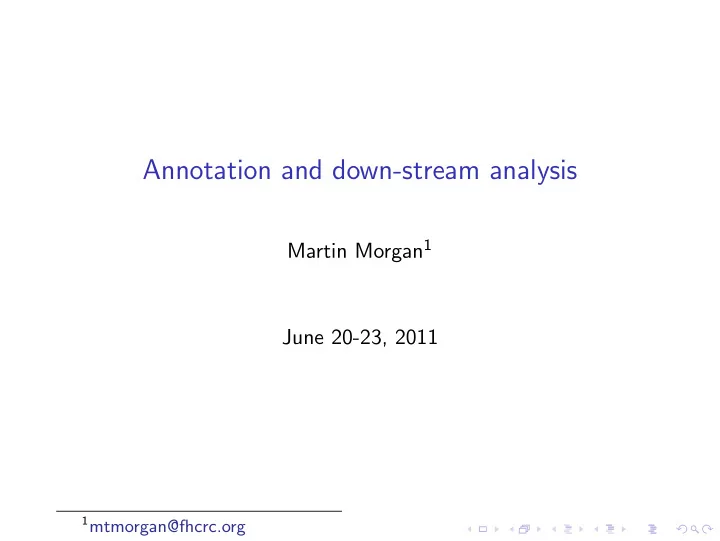

Annotation and down-stream analysis Martin Morgan 1 June 20-23, 2011 1 mtmorgan@fhcrc.org
AnnotationDbi The org.* packages ◮ Curated data base of model organism annotations, e.g., org. Dm .eg.db annotates Drosophila melanogaster ◮ Gene-centric Bimaps of ‘Lkeys’ and ‘Rkeys’ (values) ◮ Each package has a central ‘Lkey’: org.Dm. eg .db uses e ntrez g ene identifiers as the Lkey ◮ Each bimap describes the mapping between the Lkey and its Rkey / value. E.g., org.Hs.egENSEMBL maps between Entrez and Ensembl gene identifiers Metadata describing the content, e.g., org.Dm.eg() and ?org.Dm.egENSEMBL
AnnotationDbi : how it works Loading / available maps ◮ library(org.Dm.eg.db) ◮ ls("package:org.Dm.eg.db") Common operations ◮ Subset [ ; subset-extract [[ ◮ Interrogation: mappedLkeys , mappedRkeys ◮ Coercion: toTable (data frame), as.list (named list) ◮ Reverse mapping: revmap
AnnotationDbi Other AnnotationDbi packages ◮ Pathways: KEGG, GO ◮ Homology ◮ Microarray See http: //bioconductor.org/packages/release/data/annotation/
Under the hood: SQLite
Biomart Biomarts ◮ Collection of data bases with common interface ◮ Explorable at http://biomart.org biomaRt ◮ Discover: listMarts , listDatasets , listFilters , listAttributes ◮ Select: useMart , useDataset , . . . ◮ Retrieval: getBM AnnotationDbi or biomaRt ? ◮ current, stable, versioned versus up-to-the-minute, extensive, whims of internet availability
UCSC Via rtracklayer ◮ import and export common formats, e.g., bed , wig , from / to GRanges instances ◮ Start a browser session: session <- browserSession("UCSC") ◮ Lay a track: track(session, "targets") <- targetTrack ◮ Retrieve a track: ensGene <- track(session, "ensGene") ◮ See browseVignettes("rtracklayer") Via GenomicFeatures ◮ Later in presentation
GEO, ArrayExpress ◮ Previous experiments as very rich source of data e.g., GEOquery ◮ Search, e.g., ◮ Retrieve ◮ End result: ExpressionSet , a standard Bioconductor representation of a microarray experiment
GenomicFeatures ◮ Structural information about genes: exon, transcript, coding sequence coordinates ◮ Uses GenomicRanges , so fits well with sequence analysis tools ◮ Created by querying, e.g., UCSC for ensGene track ◮ Saved as SQLite data bases ◮ ‘Forge’ to create packages, e.g., to share in a working group
Recommend
More recommend